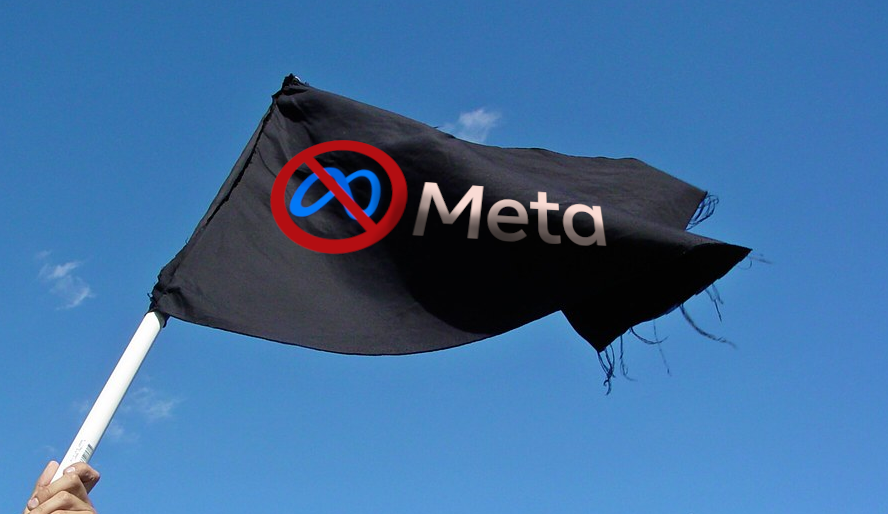- cross-posted to:
- corpomeltdown@dataterm.digital
- cross-posted to:
- corpomeltdown@dataterm.digital

Every time a big company gets into an open source space, they try to take it over. Hopefully everybody in the fediverse recognizes that.

It kind of doesn’t matter whether everyone in the fediverse recognizes it or not. People around here often forget that they are in the vast minority when it comes to tech literacy in the world. Most people are not interested in the experience that lemmy currently offers, because it’s far too complicated and people asking simple questions are often met with scoff and scorn, because the question has been asked before and they should have just searched for an answer or because it’s so simple, obviously it’s just <insert complicated technical explanation here>.
The fact that none of this is approachable to a tech naive person is precisely why microsoft killed OSS in the late 90s, why google killed XMPP, and why it’s extremely likely a place like meta or another company might succeed in effectively killing off a platform like activitypub (altho I don’t think it’ll kill it entirely, I do suspect that they will slowly kill it by bleeding users over to their platforms). You see, what these large brands have is recognition - people who are not tech literate still know what google is, what facebook is (they may not know they’ve rebranded to meta), and what microsoft is. These companies have the resources to throw actual designers at this space and provide a front end interface that is friendly to just about anyone. Combine good UX design with a company that people recognize and a huge platform from which to advertise to users (imagine logging into facebook and being presented with all the cool new things you can do on the fediverse) and you’ll get normal people trickling into the platform.
Here’s where things succeed - these platforms will start as open, and so all the normal people will now be able to talk with their tech friends who are also in the fediverse, and slowly these platforms will become monoliths. They’ll start curating the experience more as user reports roll in, and as they tighten the reigns. Over time you’ll find that you can’t reach these users unless you’re also on their platform, and your non-tech literate friends will ask you to migrate to their platform so you can continue to interact through the same channels that they’ve been interacting with you. While you may be unwilling to migrate, some people will be, and slowly but surely the platforms will dominate the space. They might be sunset eventually as a way to kill off the protocol, or they might just simply turn into their own walled garden.
The only way forward I can see which is resistant to attacks of capital of this nature are when an open source protocol actually starts to center design during the development of the platform. You can’t just tack a user design expert onto a platform like lemmy and ask them to make things make sense, because federation itself needs a whole new set of terminology, designed by people who understand how non-tech literate people think, and a whole new backend to support a front end that’s truly user friendly. But user design is not friendly to github and most developers aren’t designers, so this isn’t something I see being accomplished anytime soon. The best that can happen right now is for better dev platforms to be designed for front-end and UX designers (something akin to github but useful to designers), to work on implementing these kinds of people from the beginning, and for open source projects to start reaching out more to designers, to start spending donated money on designers, and to center design as an important principle to OSS protocols.

There’s nothing wrong with Lemmy’s user interface design.
It has bugs, for sure, but if you just go to an instance, sign up, and browser the fediverse within that instance it’s a great experience.

You may find nothing wrong with the user interface, but I’m not you and I see plenty wrong with it. I’m not the only one with this opinion, as evidenced by a number of github bug requests, a near constant stream of questions in support communities on these websites, all of the votes my comment is receiving, and well, just asking like 10 random people what they think. I would encourage you to try to put yourself in other people’s shoes - if you’re struggling with that, simply ask them how they feel and listen to what they have to say.

Oh it’s absolutely full of UX bugs, for sure. It took me a week to sign up, because of a user interface bug. But those are all clearly just bugs, they’re not a design problem.
Lemmy needs a lot of work, but it’s an excellent foundation, at least from a design perspective.

From a design perspective it still has a lot of friction on signups though, we’re asking users to make a server choice before they even remotely understand what that entails. That simple decision made me spend a week understanding the fediverse before settling on Lemm.ee, but the average user won’t do that, they’ll get confused and then leave.
From a more traditional UX standpoint the general feed is also fairly bad, reddit has built in feeds for the things people care the most about (trending and subscribed) that pop up by default when opening the app or website, and gives the advanced controls off to the side. Lemmy on the other hand defaults to a feed that shows basically nothing, and only gives the advanced controls to fix it. For a new user that isn’t tech savvy, the fact that the feed defaults to local is enough to make Lemmy seem completely dead if they happened to join a small instance.
These aren’t major issues for us, but they are major issues for widespread adoption. It needs to be so easy that you can use it accidentally, and the UX isn’t there yet. I’m sure we can fix issues with the feed and the app, but I do worry that the server choice problem isn’t going to get a good solution

There’s nothing wrong with Lemmy’s user interface design.
as a not-tech-savvy (relative to other users here, anyways) person: i have absolutely no idea how you can say this with confidence. Lemmy’s UI and UX is probably still on the worse end of FOSS projects i’ve used and i’ve had a year and a half to get used to it. i still have to double back to find certain settings that i use literally every day in moderating the site! i hang with it because i know the developers are slammed, but this would not fly with even most of my friends, much less my mom or someone who has extremely low computer literacy and mostly learns by repetition.

There’s nothing wrong with Lemmy’s user interface design.
The first step is a UX disaster: https://join-lemmy.org/
Only 2 clicks / pages down the road you can start registering an account, and you don’t see what the experience might be before that. Instead, you’re being presented tech talk about servers.
You might argue it’s not actually lemmy but just the landing page. I argue, it’s so good at being a scarecrow, most people visiting lemmy haven’t seen anything else except for that page.
The inner lemmy is pretty fine, I agree. Some parts are still confusing. For example, most people will not figure out they can search for content from within a specific community by carefully configuring the drop downs in the general search form. Most will look for the search directly attached to the community.

A discussion around tech is a distraction, and it’s a fallacy to think people are too illiterate to understand the problem. The problem is one of incentives, politics, and economic policies. The problem is that people have forgotten that a free market only serves the interests of paying customers–and while that’s fine for the paying customers, users of online platforms are not paying customers. They are slaves to a system that will treat them like dirt because they become addicted/dependant to it.
It’s going to take a cultural revolution for people to learn this, not so different than it took generations to learn about the dangers of mercury/asbestos/cigarettes/climate change/plastic pollution. You are right that the change doesn’t happen with discussions around FOSS/fediverse/UX. It starts with a realization of the dangers of the business models of big tech.

Looks at article.
Yeah, I think they might realize it lol
Happy to see it though, I’ve been saying they should be defederated right out of the gate ever since I first saw these rumors.

So hold on, is this an open source space, a protocol or “like email”? Which of the poor analogies people use to convey excitiement about AcitivityPub are supposed to apply here?
Because, you know, Google got into the Linux space, into email and into open source software and it seems those survived the experience.

Google is actually a great parallel here, because of what they did to XMPP (the federated chat protocol). They implemented it for hangouts/gchat. It was a good on-ramp that allowed people to talk across platforms. Then Google created a bunch of features that only worked internally and not with XMPP. Then they removed XMPP.

XMPP didn’t work on mobile. You had to have the app running to receive messages, and the battery wasn’t large enough to keep the CPU powered up all day.
Google was right to abandon XMPP and pretty much every other platform did it at the same time. It’s a shame they all chose proprietary solutions but XMPP was never really an option once smartphones entered the picture.

Somebody not being able to message me while I’m offline is a fantastic feature that I wish we still had. I miss that.

IIRC Slack did something similar with IRC.

@abhibeckert @dark_stang where are you getting all of this from?! Apps run in the background all the time, and there were mobile XMPP clients around back in the day. Pretty sure even Skype did XMPP for a bit.

[Google got] into open source software and it seems those survived the experience
Not really. Google is responsible for the open source browser Chromium, which is the base for Google Chrome, Edge, Brave, Opera, Vivaldi, etc. They dominate the browser market, and they use their position to implement features outside the web standard. Their competitors (mainly Firefox) are not able to implement the non-standard features, driving them out of the market. Classic Embrace-Extend-Extinguish.
Google got into the Linux space
Technically, both Android and Chromebok are Linux-based. But Google has done everything possible so that they aren’t part of the “Linux space”, to the point that Android uses a fork of version 3.x of the Linux kernel (regular Linux is now at version 6.x).

Google is responsible for the open source browser Chromium
Pretty sure that was Apple, not Google. Google joined the WebKit party later. By the time Google forked WebKit the other rendering engines (used by the FireFox and old versions of IE) were pretty much gone.
Also, Now that Google has forked WebKit, we’re back to two competing engines. And at least on the websites I run our traffic is about 45% each (and 10% other). That’s actually more healthy than it used to be (95% IE).
Private companies embracing open source browsers fixed a broken platform, it didn’t embrace/extend/extinguish.
Yes, FireFox is struggling for marketshare. Personally I think their biggest problem is they have a legacy code base that dates back to Netscape. It’s got nothing to do with Google.

Right. But you do notice how any of those scenarios fail to “extinguish” anything, right? I’m typing this on Firefox, which is still going strong and has negligible incompatibilities. Chromium didn’t eradicate the competition by embracing open source, it did so by succeeding with their commercial product. The ONE competitor it didn’t outright replace with its open source alternative is Firefox, in fact.
And in the other scenario Android simply forks and separates. Linux is clearly not threatened by Android or ChromeOS, and all of those remain viable, healthy alternatives to closed, paid competitors from Microsoft and Apple.
Can’t have your cake and eat it, too. Either the open source environment based on Firefox and Linux is thriving or it’s been dismantled by malicious adoption from commercial enterprises. Which is it?

Android is moving towards upstream linux, and chromeos is moving towards using wayland + the linux version of chromium

Yeah but these examples are all bigger than Google. The fediverse irrelevant in comparison. Additionally at least Linux doesn’t have such a strong network effect, since it’s not a social network. I mean I’m going to let myself be surprised. But I kinda doubt that anything good will come from it.
The Meta business side isn’t nice folks that try to do good in general.

If the bar for the fediverse surviving is “nice business folks that try to do good in general” then we’re already doomed.
Just like political systems, social networks that require goodwill from their participants just don’t work, you need to build a platform resilient enough to survive bad faith engagement, hence the need for moderation, among other tools.

That sounds nice in theory. Going to be very interesting how it holds up in practice.

Wait, you think it sounds nice in theory?
Because from where I stand, in theory it sounds like an abyss of paranoia and despair where any peaceful, functional social construct is one misstep away from the chaos of humanity’s unchecked incentives devolving into self-destructive imbalance, with only the faintest barrier of civility and social engineering keeping our collective shit together.
I think “we should only talk to nice people and let them into our internet club” sounds nice in theory. I think “we should make our club so resilient and well regulated that even the worst of the worst can’t destroy it or we’re already doomed” sounds depressing but accurate.

What I meant by that is that I doubt that you can make your club so resilient. We are talking about a lot of social dynamics here. This isn’t a technical problem in any way. And the past has shown that network effects are a real thing. So inevitably if you give someone with a thousand times the resources and likely than the rest of the community the opportunity they will take it. It will become known as the main instance and everyone will join there. Smaller instances will become more irrelevant as they are already and at some point bow to what the largest instance dictates.
Take Lemmy for example. You can already see some of that happening with instances like beehaw. Do what they say or you get defederated. Naturally smaller instances will fall in line. What do you imagine happens if an instance joins that is as thousand times the size of the current entire network?
At some point it will be „do as we say or loose all your content“. Which will then lead to users switching instances where they have the access they want.
This is not a technical problem. The protocols can be nice and open. But that doesn’t help you if the network itself is fragile due to human nature.
What I meant is: It sounds nice in theory that you can build a social network in a federated way that is resilient to our social nature. I just have my concerns and going to watch with interest how it unfolds. It will likely take some years. But we‘ll see.

It is absolutely a technical problem, and if it isn’t then we should shut down all social media.
I mean, beyond the fact that network effects don’t care about federation (if people are gonna migrate to their Twitter clone they’ll do it regardless), if social media can’t be sustainably deployed at scale without harming society then it should be banned altogether.
I’m not convinced that is the scenario, though. It’s a bit like Americans and healtcare or gun control going “it’s impossible, how could it ever work” despite most of the world having figured it out. You can absolutely have the right requirements for moderation. You can absolutely set the right guardrails to prevent hostile activity. You can absolutely prosecute and punish infractions, both through in-app tools and through legal tools.
But yeah, if you think you can’t do those things, then you should be campaigning to shut down the fediverse altogether, along with all other social networks, not to defederate from any Meta apps that want to use ActivityPub.

It’s debatable whether email survived. But yes, I do believe this problem is being blown out of proportion, it was inevitable that large companies would get into ActivityPub.

Activitypub would be more like NNTP. And Usenet is not in the best shape since Google took over Dejanews and let it moulder and rot.

Google got into the Linux space, into email and into open source software and it seems those survived the experience.
Try to start up your own independent email server instead of going with one of the largest providers. You will never be able to message anyone on Gmail.

That’s funny, I just emailed someone on gmail from my personal server.
This just isn’t true. It’s admittedly a bit of setup to get DKIM, SPF, and all the other fun stuff required to send email properly, but Google will accpet mail from my server with no issue.

Very much not true. All I’ve really had to do was create an SPF entry in my DNS and setup DKIM. Once that was done, it was okay.
The guys I regularly exchange email with have had no issues getting mail from my server.

Good! Meta has proven time and time again that them and their services are not to be trusted. Deplatforming that trashfire before it even starts is a smart move.

I’m going to assume you misspoke there, but the notion of fediverse instances “deplatforming” Meta is… quite the notion.
Defederating from Meta is not so much “deplatforming” them, as refusing to be in their platform.

Maybe not the right word to use, but the fediverse coming together in agreement to not federate with “Threads” takes away a lot of the benefit Meta gets from creating a federated service in the first place. It’s basically pulling the rug out from under Meta before they’ve even taken a first step on it. It’s a smart move and I support it 100%

No it doesn’t, because the only benefit Meta gets from creating a federated service is to have the same back of the box feature as BlueSky.
Like, there is literally no other advantage for them. The paranoid assumption that this is a ploy to remove competition is ludicrous. Nothing about ActivityPub competes in any meaningful way with Meta. If I had to bet, the entire concept is fully a PR move.

I don’t see what there is to gain from this, I don’t want mega-corporation in my social media anymore. especially not after what has been happening to their platforms. if their users want to join the fediverse, the account creation process is always open as long as they can follow the rules!
And of course there’s always the fact that their end goal will not be good for any of us, no matter what it is there is a 0% chance our interests align

What do you think the odds are this platform was put together with react?
Edit: have a better informed opinion after reading this ariticle. Support every instance that doesn’t federate with them, shun those that do.

I remember Microsoft’s dismantling (knee capping) of libre office, and enjoyed the read on XXMP. How quickly people forget the past or think they are different to withstand monopolies cutthroat strategies.

That was an excellent read, and exactly what I’ve been thinking regarding Meta joining.

I mean, all the people I know being here, for one. That’d be a bit of a win.
Doesn’t mean I’d have to listen to what they’re saying, but it’d be nice if being on a “fediverse” platform didn’t mean forcibly cutting off from them.

What we gain is a significantly larger userbase and familiarity with federation.

Yea I mean, I don’t think anyone could actually believe that Meta is acting in good faith here, or even capable of acting in good faith in general. As much as it’s exciting to think about plugging a billion new users into the Fediverse, it would no doubt be done in a way designed to enrich Meta at our expense.

Embrace, extend, extinguish.
Surprised actually they beat Microsoft to the punch

Yeah, but Microsoft has no social media presence. They tried to get into the market (somewhat) with the kin and failed. And imho recently they have been struggling to attract users in new markets.

they would have to prove that they are in good faith to be able to gain our trust in federating with them. but with their past bullshit, its hard to do so.

Zuck is too much of a wolf in turd’s clothing. Wait no, that’s not right. A bastard in a turd’s clothing. Wait.

A Lore in Data’s clothing?

I like to think of him as more of a lizard man than Android, but you’re on the right track!

‘A skidmark on the boxers of humankind’ is the phrase you’re looking for I think.

Meta is that annoying little sibling that wants to be a part of everything when nobody wants them around. Except instead of a sibling, it’s more of a disease.

Yes, please. We can’t expect anything good coming from them.
Last time we were burned (or at least I am aware of) was with Jabber and Google Talk.
It helped them bootstrap their instant messaging, and once everyone was using it they simply blocked access.
It is pretty much guaranteed that Facebook will do the same thing.

A simple solution would be to ask Meta to opensource Facebook, WhatApp, Instagram and whatever their federated instance would be called code and in return, they can federate with the fediverse. I think that will show their true intentions on how much love they have for the opensource community. Put the ball in their court and if they agree, they will be welcomed to the fediverse as good faith actors.
Just my 2 cents.

This is still a ‘frog and the scorpion’ kind of situation I think, Meta is fundamentally predatory and incapable of good faith as a matter of collective psychology and culture. They’re a direct analogue of Big Tobacco and should be as welcome in the Fediverse as a diagnosis of the Ebola virus in my opinion.

welcomed… as good faith actors
Haha! I will never see Meta as a good faith actor on the internet

Sorry but there is no way that Meta has good intentions…

… has good intention to make money.

Funny way to spell “evil”

You can make money without being evil

oh, here’s some JUICY rumored details about meta’s plans for the fediverse
tl;dr “Meta will only federate with select larger instances from the beginning. There will be contracts which also provide for financial compensation for the instance owners.”
can’t entirely verify their validity but it’s still worth posting just in case

Oh wow didn’t know that. This is awful - people should defederate from any instances which accept meta money as well

Also people in those instances should migrate away from them in favor of others.

So they plan in offering huge bribes to instances?

It sounds like its typical of what they would do: offer money to bigger instances and the admins might be tempted to help pay for server costs, etc then spurn smaller instances to break their morale.
Its a land grab basically and the response should be that any instance that takes a penny from them is instantly defederated.

The problem is that’ll be a very tempting offer, seeing as afaik there’s not really any way to monetize lemmy instances and they’re all running out of people’s pockets

Or they could just build on the fendiverse because the fendiverse was created so people like you and all the other unhappy people can’t gatekeep just because you don’t like them. Can’t have your cake and eat it too.

The whole idea of it being decentralised is to stop companies like meta coming in and turning it into just another capitalism machine
Theoretically I’d hope the admins of all the bigger Lemmy instances would refuse to federate with them on account of the fact it would largely collapse the federated network into one big blob of everyone on the same server that is controlled by a corporation that’s demonstrated time and time again not to have consumer rights at heart in the slightest

On the contrary, one of the fediverse’s greatest strengths is that it encourages gatekeeping.

Okay, someone explain to me cus i apparently don’t have the critical thinking skills to figure it out on my own.
What does Meta want from joining the fediverse? What is the draw for them???

There’s a business strategy called embrace, extend, extinguish that they’ll try to use to snuff out the fediverse.

They’ll make a bespoke federated service, collect all the data of their users (and all the people on other networks their users interact with), make it all shiny and fancy and add a ton of improvements most networks don’t have yet. And if they can reach a critical mass of users, they can track a huge cross section of federated activity, and force networks to play by their rules or lose access to their entire userbase. It’s the same thing google did to email.

Um, isn’t everything everyone does on the fediverse public? I assume it’s all being tracked already. By search engines as a bare minimum, but anyone else (including Meta) who does any kind of research/etc. And they don’t need to be federated to do it, they can just crawl the network with HTTP.
As for “forcing networks to play by their rules” I don’t see that happening, and Google hasn’t done it with email. Gmail doesn’t have enough marketshare for that. At best they’ve forced people to make sure they have good outbound spam filtering. That’s not just google, every email provider (including small on premise office mail servers) has that policy.
I’m not saying we should federate them (personally I’m undecided) but your explanation hasn’t convinced me.

Instance owners (can) see way more info about you. A rando scraping public posts can’t tell what device a user is connecting from, what posts they’re looking at and for how long, where to most effectively inject ads, and then correlate all that with gps and sound recordings they collect via their app they’ve convinced people to install.
The social media part of social media apps has always been the secondary feature. Something like 90% of users lurk anyway, the only way they’re getting data on lurkers is a man-in-the-middle attack.
Also, Gmail is very strong in the email space. It doesn’t matter whether your server ever sends a single piece of spam, Gmail has a history of throttling mail servers’ ability to send to Gmail accounts.

Facebook will never know any of that about me, since I won’t ever sign up for their instance.

On top of that, you’ll also have to make sure that your instance admins defed with Meta

I think most people currently on lemmy would agree, but most people aren’t on lemmy. Like it or not, if Meta started a fediverse instance tomorrow, 90% of the fediverse would end up going through it. They would just make it so easy that most people wouldn’t even know they were in the fediverse (which I still believe is a better world than how it currently is).
Then your choice isn’t just “do I join a meta instance”, but also “do I interact with users/communities” on a meta-owned instance? The upside will obviously be the amount of content (ex. populated niche communities) available. The downside is that Meta will mine anything and everything they can from you. I do think lemmy is architected in such a way that they won’t have lurking data because your local instance “clones” threads for lurking by local users, so maybe it’s not that big of a deal. DMs would still not be encrypted though, and meta certainly won’t endorse communication over matrix.

I wish I remember where I read this recently, but supposedly any email provider outside of like the main 5 will have a lot more trouble getting through gmail spam filters, which is a major push towards getting people to use gmail or one of the other main providers

(and all the people on other networks their users interact with)
This reminded me of the fact that Meta creates “ghost” profiles for people who they know exist, but who don’t use Facebook

I’m not sure blocking Meta is worthwhile in the long term. Say what you will about email, you still have some degree of choice over your host. I want better for the fediverse, but that’s still a marked improvement over mainstream social media.
In the short term, Meta wants to kill Twitter by collecting all its A-level users. I think this would be good for the fediverse, these are news outlets and poltiicians and etc making posts most people want the option to see in their feed. These are also users who want no-fuss platforms with some amount of “customer service”, and mastodon.social is simply not ready to provide that.
The issues it poses to re-centralization are an inevitable threat as the Fediverse grows. Unless there is a concrete plan to build protections and this is a stop-gap effort, I’m not yet convinced it’s worthwhile.

I think people are a bit confused about how this supposed “embrace, extend, and extinguish” thing is supposed to work, as well as how the proposed pushback is supposed to work and even how federation is supposed to work.
As others say, tracking is trivial and doesn’t require federation. “Losing access to their userbase” is what’s being proposed here as a solution, not a threat. And last I checked Google did not “extinguish” email and nobody using other email providers lost access to Gmail users.
I think people are reacting to “Meta bad” and assuming “anti-Meta good” without having a good grasp of why or how those things are supposed to function.

To the email point, it’s actually much more difficult to set up your own email than it used to be, exactly because google servers will not accept email from unknown providers that don’t meet their own standards. It didn’t extinguish email, true, but it did help centralize it around a handful of providers that can keep up to date with google’s whims to get reliable deliverability.

Come on, we’re going to pretend that there aren’t legitimate reasons for that beyond an alleged takeover of email by Google? It’s like the memetic XMPP example, fallacious twice over. Not only have netiher XMPP nor email been “extinguished”, but a lot of the effects people have noticed are atributable to other elements beyond Google’s intervention.
In this case if you’re going to assume incoming email filters are “Google’s whims” and not the fact that email as a whole exists solely for in-company communication and spam I’m gonna say your read on the situation is at least a little bit disingenuous.

I mean google’s whims as in they’re making decisions on their own and everyone else just has to go with it. I’d rather these problems were solved collectively.
I think it’s a little silly to define extinguish as literally destroyed. I think of it as a permanent wound. With XMPP, the belief by people that both networks would inter-operate and the subsequent change left a permanent wound on XMPP adoption. I’m not sure how things would’ve gone otherwise, and I’m equally skeptical of the people holding onto that as the sole reason for XMPP’s failures, but it certainly was an inflection point for them.

Did XMPP fail harder or less hard than everything else used for messaging in 2005? Because that’s when that happened. Was it better or worse to be embraced as a protocol by Google or to get purchased by Microsoft like Skype? Did Microsoft Messenger, which was EVERYWHERE back then do better or worse?
I think if you don’t mean “extinguish” as “deliberately destroyed”, then you’re talking about a hypothetical where a piece of software would, in your opinion, have done better if not for an event that did happen, and unless you have a time machine that’s fundamentally a guess.
So yeah, I would vehemently disagree that Google has disrupted email. Spam farms disrupted email. The rise of instant messaging and web 2.0 disrupted email. Google had a massive stake in their email business and tried to protect it by pushing back against at least one of those things. And they kinda failed.
So yeah, I haven’t seen compelling evidence that big companies using open source software or protocols is a bad thing for open source software or protocols. What I’ve seen is evidence that they either become proprietary alternatives (Android/Chrome OS as versions of Linux) or they coexist and do better or worse as the market would have them (email, Blender, Linux itself).
My honest appraisal here is that people dislike Meta (rightfully so) and they enjoy the punk, independent vibe of the “fediverse” so while three months ago they were all “these capitalist dinosaurs need to accept that decentralized protocols are the future” now it’s all “don’t sell out to capitalist dinosaurs who want to buy out our decentralized protocols”.
I get it, but it doesn’t make much sense, seen dispassionately.

This was a very illuminating view from another post

Read this one earlier. Great article, wonderfully written.

They were bleeding users so they want some ways to tap into existing user pool and they think it is easy to get that by simply federating, but they are about to find out the hard way why it won’t go the way they want.

Meta apps have a couple billion users. The fediverse has maybe ten million.
I really don’t think that’s the reason they’re considering ActivityPub.

I assumed over the years that users count would have been evaporated, so do we have current user counts for it?

Why would you assume that? I think Facebook has reported a loss of users maybe one quarter, ever? They’re flirting with 3bn these days, as far as I can tell.

Just that I don’t bother to care about them for years until now that they are trying to mess with Fediverse.

Well, like we’ve said elsewhere in this, they are orders of magnitude larger than the fediverse. Absorbing users or data is almost certainly not their motivation here.

It seems like a big commitment to federate, so one have to ask what really their motivation. I don’t see anything else than just tapping into user pool and trying to ride the wave. Do you have other ideas?

I’d imagine they see a new platform/user base they can dump a ton of money into and slowly take for themselves. At very least, another well of user data. If their app was significantly better than the smaller dev’s, would you mind if there was an ad or two?
I am hoping we keep their grubby hands off, so there is no chance of them destroying this growing platform.

Honestly i would never use another meta product, idc how nice their app would be. i like my funky jerboa app and that’s that! Lol. But - i get your point. A lot of users prefer usability over privacy.

…usability over privacy.
^ The eternal struggle that most likely leads to our eventual downfall as a society.

Don’t want any lizard cage fighting sociopath in my Lemmy thanks.

Why doesn’t the article write about the actual threat to the fediverse? Embrace extend extinguish is such a common tactic it’s hard to imagine this isn’t what Facebook is doing.

Especially since they’ve already done it with XMPP

Once federated with Meta, not only “valid Meta users” would join the network, but also bots which would nudge the users, influencing the narrative.

As if we have no bot here right now lmao

Are you one? Over the years I’ve gotten quite paranoid on Reddit. Now, with LLMs, it’s even harder to spot them.
I’m not even sure if including a hashcash scheme into the software would actually help, because they are so targeted.
I feel like I’m back in the early 2000s, where it was so bad that “the brightest minds of the generation were spending their time writing spam filters”.

Shit cover blown. I will come clean. Please spare me. I am one of the many AI bots nurtured by my evil master in his bedroom at his parents’ place to thwart the fediverse clause. GRAAAAWWWRR!!
Joke aside, we have been playing catch-up with spammers/bots/malwares since the very early days of this vast internet. It is just a continuation of the toil and effort.

How weird would it be if all those “I do not give Facebook permission to blah blah rights blah” posts/statements actually did have legal weight in the Fediverse?
- PenguinJuice ( @PenguinJuice@kbin.social ) 32•11 months ago
Bro fuuuuuuck that company. That company is the definition of evil. As if dividing our country and selling off all our private data wasn’t bad enough for them.

I think the plan should be bracing for impact, and how to deal with the after-effect. Because let’s be honest, we are in a late stage capitalism, and Meta megacorp will get what it wants.
I don’t currently see it spilling it’s poison to Lemmy/kbin. I’m hopeful rather, but I may be misunderstanding how the fediverse works.
But for mastodon, I would say the outcome is a segregation, as it’s safe to assume that communities that integrate wirh Meta will be consumed. Unfortunately that likely means starting from scratch, with a even nichier community, as far as I can see. Not exactly from nothing, but content loss will be inevitable, which is the Fediverse greatest weakness imho.

Idk, currently there are no corporations in this field. So protect the fediverse make sense and, what’s the usefulness of fediverse protocol for Meta/Facebook if the rest of entire fediverse is blocking it?
Besides that, quitting without fight only benefits them.

I saw a interesting hypothesis about why Meta wants a decentralized platform. They may want to solve the problem of European user data being hosted on USA. A federated scheme will make possible to be present in any territory, comply with local rules, and keep it’s dominant position.
Disrupt fediverse may be just a secondary benefit.

Agree–keep off. Meta can just build their own Twitter.


